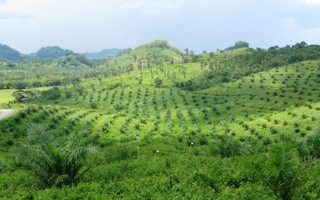Residents of Palawan Island in the Philippines have united to take on the companies that they say have grabbed their land. Seventeen indigenous communities on this island province are campaigning for justice from the companies that have grown palm oil on their farms.
Palawan is a large island-province of the Philippines that lies midway between the rest of the archipelago and Borneo. The great beauty and biological value of the island was validated in 1990 when the United Nations Educational, Scientific and Cultural Organization (UNESCO) conferred the status of “Man and Biosphere Reserve” on this tropical paradise.
In recent years, however, there has been an onslaught from mining and agribusiness keen to exploit its natural resources.
Palawan’s pristine coastline gives way to coconut palms and then lush rolling forested hills speckled with tribal houses. This municipality of Quezon in central Palawan is the domain of the Indigenous Tagbanua people. They say a proportion of their lands have now been appropriated for palm oil cultivation.
In 2002 the Philippine government decided to expand palm oil cultivation in the archipelago to reduce imports and to fulfill the country’s rapidly growing domestic consumption.
That same year, the Department of Agriculture calculated that average palm oil production was 54,333 metric tonnes, with consumption running at 94,400 metric tonnes. Growing demand was expected to have reached 171,700 tonnes by 2015.
Today these expansion trends continue and in 2013 The Philippine Palm Oil Development Council Inc. (PPDCI) published an ambitious roadmap for expansion reported the Sunstar newspaper in the Philippines on August 27, 2015.
It said the PPDCI “is eyeing another 300,000 hectares to expand oil palm plantation in a bid to make the country self-sufficient to palm oil products…The council targets to achieve, under its palm oil industry roadmap, the expansion in eight years from 2015 to 2023.”
Two major palm oil companies operate in Palawan: Palawan Palm & Vegetable Oil Mills, Incorporated (PPVOMI) and Agumil Philippines, Incorporated (AGPI). PPVOMI is 60 percent Singapore-owned and 40 per cent Filipino, whereas AGPI is 75 per cent Filipino-owned and 25 per cent Malaysian.
The parent company of AGPI is Malaysian-registered Agusan Plantations Incorporated. Other smaller companies are also joining in the “golden oil” rush.
AGPI has established a palm oil mill in the Municipality of Brooke’s Point for the processing of plantation harvests. As such, it buys 100 per cent of the PPVOMI production.
With 70 per cent of processed oil due to be exported to Singapore, China and Malaysia, the original rationale to supply domestic production appears to have been contradicted.
In deals struck with palm oil companies, different communities in central and southern Palawan agreed to lease areas of their farm and forest land in return for a share of the income from the palm oil profits. In other cases, local people leased parcels of land under customary native title to palm oil companies at low rents.
“We wanted to plant palm oil because the conditions were good. The conditions offered by the companies. But until now, it has been six years and we have not received any benefits,” said Graciano Muniz, tribal farmer from Aramaywan community [Baringay], in the municipality of Quezon in central Palawan.
In the seven years since the first leases began, none of the participating cooperatives have reportedly received a single payment, despite four years of harvest since the plants reached production maturity at around three years.
“The landowners were fooled by this company. To the extent that prior to that they have lands to till, they have lands to plant the crops for their living,” said Rodiar Carlio, a member of the Coalition against Land Grabbing (CALG), an NGO galvanizing resistance to the palm oil companies in Aramaywan and neighboring communities. He is negotiating with AGPI for a solution to the dispute.
Palm oil has increasingly entered our food supply chain in the past 20 years and is now found in a multitude of consumer items from biscuits to shampoo. Viewed by food companies as a wonder crop, the prolific harvests of palm fruit are rich in saturated oil. However, the crop has courted controversy wherever it has been grown.
Huge swathes of the great tropical forests on the island of Borneo have been felled to make space for oil palm plantations. Since then, cultivation has continued to spread throughout Southeast Asia – and even into Africa (where the wild oil palm originates) and South America – to feed an insatiable demand for the golden oil.
When sales teams from AGPI originally came knocking seven years ago, some tribal and farm communities were attracted to the high incomes the company promised relative to their dominant cash crop of coconut palm – which is still widely cultivated. Many signed-over a proportion of their private farmland for palm oil cultivation.
Roberto Bardolassa is one of these farmers. He moved to Palawan in 2007 from Rizal Island to cultivate his wife’s land.
“At that time the company was organizing and looking for landowners to cooperate with their company…so we decided to be their partner,” Bardolassa said.
Bardolassa and his wife leased three hectares to AGPI, but have since regretted it. “I think that what has happened here is indirectly land-grabbing,” he said. “If not why can’t we till our own land?…The rights of the poor people here – especially the farmers in Palawan, are being exploited by that crocodile Agumil.”
This story is published by Mongabay Reporting Network. Please continue reading the rest of the story here.

















